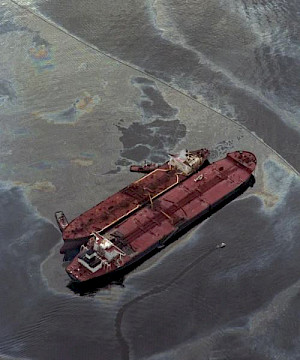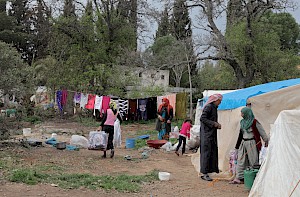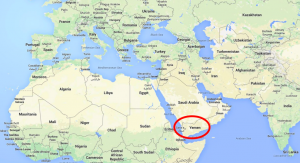There’s a decrepit supertanker off the coast of Yemen — it’s another Exxon Valdez disaster just waiting to happen
February 07, 2023Originally published in The Toronto Star on January 31, 2023 as contributing columnist
In an era of bad news headlines, when we’re oversaturated with dismal news on wars, inflation, and an endless barrage of negativity, forgive me for piling onto the heap as I share one additional crisis you might not have heard much about.
It involves the war-torn nation of Yemen, which has endured a conflict claiming nearly 400,000 lives to date and left a humanitarian disaster including famine and disease in its wake. This crisis you’re probably already aware of.
What is lesser known is the crisis within a crisis, and the aging supertanker FSO Safer, currently anchored off the coast of Yemen. This is an issue that is adding fuel to the fire not only in that country but is also of grave concern to the region and possibly the world, as it is an environmental disaster in waiting of unimaginable proportions.
The good news is that it is entirely solvable if the UN and its member states act expeditiously and prudently.
The FSO Safer is a decrepit floating storage and off-loading facility in an advanced state of decay containing 1.14 million barrels of oil which threatens to cause unprecedented humanitarian, environmental and economic damage. In an absolute best-case scenario in which the pipeline is not ruptured and the highest possible amount of the oil evaporates, a spill of Safer’s cargo would still parallel the 1989 Exxon Valdez disaster when more than 250,000 barrels of oil spilled into Prince William Sound, Alaska, and the effects of which are still felt today.
 It’s a calamity none of the combatants of the Yemen conflict, nor anyone in the world should want. In addition to the estimated $20-25 billion cost of such a monumental spill, the long-term damage would be far-reaching.
It’s a calamity none of the combatants of the Yemen conflict, nor anyone in the world should want. In addition to the estimated $20-25 billion cost of such a monumental spill, the long-term damage would be far-reaching.
It would not only decimate 10 unique species of fish, but also the world’s only known temperature-resistant coral system, and both the fishing and coastal tourism sectors of the Red Sea basin. And there is considerable risk that it will contaminate coastal desalination plants on which millions of people rely for drinking water.
Given surface toxicity and the challenge of a cleanup operation after a spill, aid shipments into the port of Hodeidah would likely be disrupted at a time when even a slight delay will have fatal consequences for the millions of Yemenis living in famine and subsisting on that aid. Red Sea shipping represents 10 per cent of global trade, meaning the disruption to global shipping would also be significant.
The negotiations around a solution to this looming disaster, much like the war itself, have been complicated to say the least. The Yemen conflict is essentially a civil war where both sides have played proxy to rivalries between the Saudi Arabia/UAE coalition and Iran with the U.S. playing a supporting role for the coalition. Actions such as the recent termination of the FTO (foreign terrorist organization) designation of the rebel Houthis by the Biden administration was a welcomed step as the designation made negotiations with Houthis by many third parties all that more difficult.
The International Crisis Group, of which I am co-chair, has been not only following the conflict since its beginning, but has also played a significant role in advocating for solutions and has campaigned against certain tactical decisions that would have made the humanitarian crisis even more devastating.
In its latest report the Crisis Group states, “Yemen’s war is in an anxious state of suspended animation. In April, the UN arranged a truce that expired last October. Since it lapsed, the Yemeni and regional parties to the conflict have observed a truce-without-a-truce, largely holding their fire while the Houthi rebels pursue bilateral negotiations with Saudi Arabia, which they view as their true adversary. But as these talks sputter along, the Houthis and their Yemeni rivals in the internationally recognized government, the (PLC), have begun preparing for another round of fighting and escalated a parallel economic war.”
The Safer crisis can’t wait on the uncontrollable timeline of an overall political solution. It needs to be dealt with separately. The UN has been at pains to keep the Safer crisis separate from the Yemen war, realizing that the belligerents will try — as they already have — to politicize the issue and in the process further delay the salvage operation. But within the UN, too much attention has been paid to securing funding for the transfer of Safer’s oil off the floating storage facility and not enough attention on how to do it properly. Some industry experts believe the UN’s stated approach is misguided and potentially dangerous.
I spoke to Sir Alan Duncan, former U.K. Minister of State, and former U.K. Envoy to Yemen who said, “Sorting out how to pay for this is secondary. The UN first needs a detailed plan which addresses the complexities of trans-shipment — it is a dangerous engineering challenge, and there are massive legal issues around ownership, risk, and liability. Only then can they, and everyone else, get to grips with the political and commercial agreements with the Houthis which are essential to any solution.”
The technical issues are daunting, especially in unloading the oil. The on-board systems are all down, so everything — the power, pumping equipment and safety measures (including firefighting) will all have to be provided exteriorly. Once the oil is transferred, it should be taken directly to a refinery capable of refining it. Duncan says should not be left floating off the coast as is currently under consideration due to Houthi demands.
The UN and other related agencies must use a carrot-and-stick approach to these negotiations. Numerous sources including the UN, estimate it would require anywhere from $75 to $80 million in funding to unload the cargo and ship it to a refinery. Additional funding (estimates range anywhere from $35 -$50 million, depending on what type of vessel or facility is used) if the oil is to be transferred and left floating in the same location. Whatever the final number comes to, it’s a pittance compared to the gargantuan costs of a future spill. Parenthetically, Saudi Arabia and its U.S. weapons supplier which have spent billions bombing Yemen, have only committed a pitiful $10 million each to this salvage effort.
For their part, the Houthis have been difficult to pin down. They have viewed the state of the FSO Safer as a bargaining chip and often complain that the world is too focused on this environmental issue and less so on the humanitarian needs Yemen faces. They also have the misguided view that the oil cargo is worth significantly more than it actually is. In reality, the quality of the oil has deteriorated over the years and is considered distressed cargo.
After completing an emergency plan, which is paramount, the UN should work harder to provide the Houthis with a reality check that retaining a huge quantity of oil in the replaced tanker remains a source of danger due to the floating mines and the risk of renewed fight. The oil should be refined and sold to pay the civil servants’ salaries.
Dr. Ian Ralby, an expert on maritime and resource security, and his team at I.R. Consilium, have been reporting on the Safer crisis for nearly five years. “No matter how many times the Houthis renege on their agreements, the UN must keep working to get this oil off the water”, he said. “This issue is much bigger than Yemen and we cannot afford to let the Safer meet its demise while still carrying that cargo.”
Every day counts. There is no knowing if the current Saudi-Houthi bilateral talks will succeed and it is possible the fighting could resume at any time. The UN must prioritize this issue. In an ideal world, it would make the most sense to remove the oil from the Safer and ship it to a refinery, thereby preventing a potential future disaster caused by leaving the oil floating on a new storage facility.
Given the Houthi’s position on this issue, that point of negotiation might prove to be a bridge too far. The UN, its member states and even private groups must immediately provide the funding required to transfer the oil off the Safer.
Of greater importance, the UN must listen to the experts and ensure the engineering issues of unloading the cargo are addressed properly.
This looming disaster is wholly preventable, and a solution would be a welcomed piece of “good news” in these troubled times.










